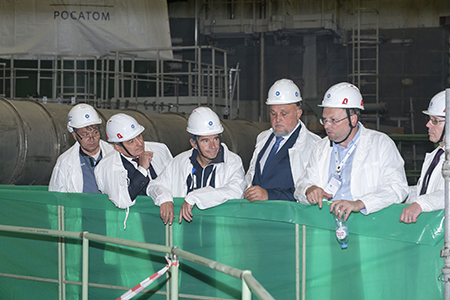"Though we have achieved progress, our work is not over. That is why I support the mission of the Arms Control Association. It is, quite simply, the most effective and important organization working in the field today."
IAEA Warns of Risks at Russian Nuclear Plant
September 2024
By Garrett Welch
The head of the International Atomic Energy Agency (IAEA) visited the nuclear power plant in the Kursk region of Russia as threats to the facility grew because of the Russian war against Ukraine.

IAEA Director-General Rafael Mariano Grossi told a news conference after the Aug. 27 site visit that the plant was extremely fragile because it had no protective dome. “The danger or possibility of a nuclear accident has emerged near here,” he said according to Reuters.
Grossi said the plant was still operating very close to normal, but this meant the security situation was even more serious, the news agency reported.
Russia has accused Ukrainian forces, which recently launched a ground assault into the Kursk region, of repeated attacks on the plant. Reuters reported on Aug. 27 that Ukraine has not responded to the allegations.
The IAEA has said it was informed by Russia on Aug. 22 that the remains of a drone had been found within the plant. The same day, Russian President Vladimir Putin accused Ukraine of trying to strike the Kursk facility in an overnight attack.
Tensions rose in recent weeks after Ukrainian forces launched a ground assault and pushed into Russian territory for the first time since the full-scale Russian invasion of Ukraine began in 2022. As of Aug. 27, Kyiv claimed to control roughly 1,263 square kilometers of Russian territory in the Kursk region and advanced to within 40 kilometers of the plant.
The nuclear facility contains six reactors, of which two are fully operational, two are shut down, and two are under construction. According to photos obtained by the BBC, Russian forces appear to be constructing defenses and digging trenches near the facility. Russia has since accused Ukraine of planning to attack the facility and blame it on Russia, which Ukraine denied as “insane” propaganda.
For months, Grossi also has warned about potential damage to the Zaporizhzhia Nuclear Power Plant in Ukraine, which Russia occupied early in the war and has been attacked by drones. “These reckless attacks (against both plants) endanger nuclear safety at the plant and increase the risk of a nuclear accident. They must stop now,” Grossi said in an Aug. 11 statement.
The IAEA team on-site at Zaporizhzhia reported that a fire broke out at one of the facility’s cooling towers on Aug. 11. The agency statement said the team “witnessed thick dark smoke coming from the northwestern area of the plant.” The team also reported hearing an explosion, and the Russian operators at the facility reported that “a drone had allegedly struck one of the plant’s two cooling towers.”
The fire has been contained, but Zaporizhzhia personnel suggested that the cooling tower may need to be dismantled. The IAEA statement confirmed that there was no immediate impact on nuclear safety.
Ukrainian President Volodymyr Zelenskyy on Aug. 12 blamed Russian forces for starting the fire in an attempt at “nuclear blackmail,” while Zaporizhzhia’s Kremlin-installed governor blamed Ukrainian shelling.
The IAEA inspected photos of the cooling tower and did not report any visible foreign objects among the debris. Grossi said the evidence gathered suggests that the fire did not start at the base of the cooling tower.
Russia previously accused Ukraine of conducting drone strikes on June 19 and 21 that cut power to residents of Enerhodar, near the Zaporizhzhia plant, which the IAEA condemned as “unacceptable.” (See ACT, July/August 2024.) The IAEA, in an Aug. 17 statement, confirmed that a drone strike hit a road around the plant’s protected area that day.
In an Aug. 9 statement, Grossi called on both parties “to exercise maximum restraint in order to avoid a nuclear accident.” He reiterated that “any military action taken against the plant represents a clear violation of the five concrete principles for protecting the facility,” established by the UN Security Council in 2023. These five principles seek to ensure nuclear safety and security, including prohibitions on an attack of “any kind from or against the plant, in particular targeting the reactors, spent fuel storage, other critical infrastructure, or personnel.”
Prior to the latest round of escalations, the UN General Assembly adopted a resolution demanding that Russia immediately return full control of the Zaporizhzhia plant to Ukraine.
